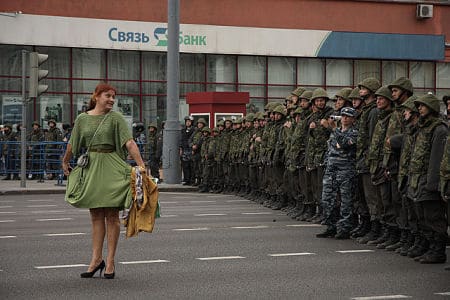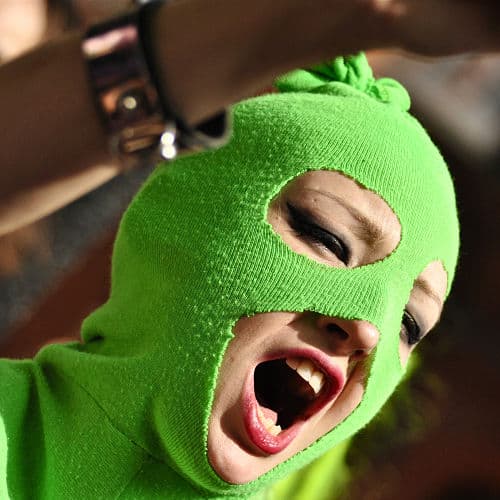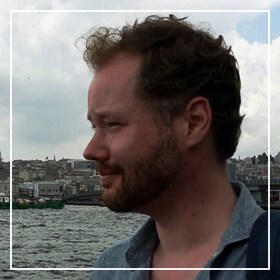Russian politics fare well in keeping conflicting stories alive. Sir Winston Churchill famously said that the Soviet Union is a “riddle wrapped in a mystery inside an enigma.” In the Soviet Union the riddles, mysteries, and enigmas might have been wrapped together as a single mind boggling story. Nowadays, the enigma, the mystery, and the riddle exist side by side. Not only do state authorities cause confusion in the civil society sector with contradictory policies, Russian news agencies add to the problem by spreading conflicting stories such as those concerned with the downing of flight MH17 and, more recently, the assassination of former vice prime minister and opposition leader, Boris Nemtsov on the Bolshoy Moskvoretsky Bridge next to the Kremlin. Considering how small the opposition and civil society is, one cannot help but wonder: who needs to be afraid of human rights defenders in Russia?
Confusion and Control
Few optimists remain. After the introduction of laws banning propaganda on “non-traditional” relations, the Pussy Riot trial, the annexation of the Crimean peninsula, the crash of Malaysian flight MH17, the lingering conflict in East Ukraine, and the killing of former vice Prime Minister and opposition leader Boris Nemtsov, there is little left to be hopeful about and, even when a shred of optimism is retained, it is increasingly difficult to stay neutral.
The playing field has changed fast over the last year, especially for Russian human rights organizations.
Since the mid-2000s the Russian Federation has taken a harsher stance on human rights organizations out of fear of a popular “colored revolution” as had happened in Ukraine, Georgia, and Serbia, in all of which foreign funders had sponsored parts of the opposition, while youth groups helped to diffuse popular protest from country to country (Bunce and Wolchik 2006). Out of fear that the revolutions abroad would spark protests in Russian streets, the authorities decided to cut the financial links between the opposition and foreign funders (Carothers 2006), and the Russian Parliament, the State Duma, passed laws in 2005 and 2006 to monitor the activities and finances of nongovernmental organizations, drafting legislation against “extremist” activities.
After Vladimir Putin returned to the presidency in 2012 after the liberal Medvedev regime, Human Rights Watch (2013) reported that, “[t]he authorities have introduced a series of restrictive laws, [they have] harassed, intimidated, and in several cases imprisoned political activists, interfered in the work of nongovernmental organizations (NGOs), and sought to cast government critics as clandestine enemies, thereby threatening the viability of Russia’s civil society.”
In rapid succession the Duma passed laws to recriminalize defamation and install higher fines for people participating in unauthorized demonstrations.
For instance, after a demonstration against Vladimir Putin’s inauguration as president on Bolotnaya Square on 6 May 2012, hundreds of demonstrators were arrested and prosecuted. In the “Bolotnaya 6 case” ten had been sentenced to 2.5 to 4.5 years of imprisonment by February 2014.

The “foreign agent law”, passed in July 2012, confused the rules of human rights activism further. The law stipulates that every organization that receives funding from a foreign sponsor and is active in so-called “political activities” should register as a foreign agent (inostrannyi agent) with the Ministry of Justice. Two years ago, one optimistic lawyer still joked that: “there are no foreign agents in Russia”, as all human rights organizations refused registration. In February 2013, eleven NGOs, among which were Memorial and the Moscow Helsinki Group, filed a complaint with the European Court of Human Rights in Strasbourg, France, to fight the law outside Russia’s borders. Nevertheless, since March 2013 prosecutors have started inspections into the activities of organizations and have begun to prepare administrative and civil lawsuits against a selection of those who have refused to register. From May 2014 onwards, the Ministry of Justice was given the authority to register NGOs as foreign agents on its own initiative.
The effects of the policy on NGOs have been ambiguous. Some organizations received a warning to register within one month; some faced a civil lawsuit as their failure to register “harmed the public interest”; some leaders faced personal administrative charges but four out of six of these won their cases in court (Human Rights Watch 2015). In the administrative cases against the organizations themselves, six out of twelve organizations won their court cases (Human Rights Watch 2015). Some organizations chose to shut themselves down, such as the Anti-Discrimination Center (ADC) Memorial in Saint-Petersburg, two Golos election watchdogs (Golos Association and Regional Golos), JURIX (Lawyers for Constitutional Rights and Freedoms) (Human Rights Watch 2015). In some regions, outside of the major city areas, NGOs have successfully won their appeals before domestic courts. In St. Petersburg, the Anti-Discrimination Center Memorial, which worked to counter discrimination against Roma and other minorities, shut down after it had faced civil and administrative lawsuits (ADCM 2014).
At the same time, however, the state authorities have offered grants to those organizations that register with the Ministry of Justice as foreign agents, for instance through the Presidential Grant system.
By vilifying those that receive foreign funding and yet concurrently offering them state funds the Russian Duma and the Presidential administration have created a confusing environment.
The duality of the policy puts organizations in the difficult position of choosing between cooperation with the government or opposition to it (Daucé 2015). Each organization has to negotiate its individual relation to the state, which obstructs cooperation between them (Daucé 2015).
Control breeds Creativity

Despite the increased control and sometimes real physical danger, human rights workers, NGOs and journalists have had to find ways to reinvent their work and maintain their livelihoods. As a result they might renegotiate their relationship with local authorities, give in and register as a foreign agent, appeal court decisions, or reformulate their own strategies.
The Joint Mobile Group is one example. The group of lawyers from the Committee Against Torture, under the leadership of Igor Kalyapin, wanted to continue to give legal aid in the North Caucasus while simultaneously protecting themselves from harm. After the killing of Memorial activist Natalia Estemirova in July 2009, Memorial – one of Russia’s oldest human rights organizations—had to scale down its monitoring activities in Chechnya because of the threats against its staff (Daucé 2012). Memorial, together with the British European Human Rights Advocacy Centre has also been active in lodging, and winning, applications with the European Court of Human Rights on behalf of relatives of victims of enforced disappearance, torture, and indiscriminate bombings (van der Vet 2012). In general, the level of threats against human rights activists in the North Caucasus are many times higher than in other parts of the country (Kogan 2013). Nonetheless, the Joint Mobile Groups continued to give legal aid to victims of grave atrocities after the second conflict in Chechnya ended, when Ramzan Kadyrov became president of the republic, though members differ on every visit to the region to minimize targeted pressure on individual jurists, and they do not stay for longer than two to three months at a time. While only one of the members has the power of attorney, they also try to maintain a horizontal hierarchy in the team to minimize targeted threats. In 2013 the group won the Martin Ennals Award for Human Rights Defenders; in December 2014 their office was set on fire in Grozny.
Another such creative initiative is the recently launched Meduza Project; an aggregator of news from Russia, with a rather gloomy Interface. The site boasts the slogan “the real Russia, today”. A small group of these journalists were at first involved in the website lenta.ru, but resigned after Galina Timchenko was fired from her position as editor-in-chief, allegedly over a conflict about the reporting on the Ukrainian crisis. They rent their office and also use servers in Riga, Latvia, to collect news items, some translated into English, from trusted sources in Russia, supplementing them with their own articles. The project, for instance, recently published material reporting on how Russian citizens are prosecuted in court for online behavior such as posting selfies. The Meduza Project will also diffuse news through an app in the Russian Federation, as there is no effective legislation to ban apps at present.
Despite the small-scale of opposition and restricted active civil society sector, the professional lawyers and journalists who comprise it continue to develop creative projects or seek their offices elsewhere, though given the number of organizations that have shut down during the past year, there is less to be optimistic about. But it is also unlikely that these lawyers will stop doing their jobs.
Human rights present a clear story and perhaps it is story to be afraid of, as it may very well trump the various enigmas, mysteries, and the riddles that are sent around inside Russia.
ADCM. 2014. “ADC ‘Memorial’ Website.”
Bunce, Valerie J., and Sharon L. Wolchik. 2006. “International Diffusion and Postcommunist Electoral Revolutions.” Communist and Post-Communist Studies 39 (3): 283–304. doi:10.1016/j.postcomstud.2006.06.001.
Carothers, Thomas. 2006. “The Backlash against Democracy Promotion.” Foreign Affairs 85 (2): 55.
Daucé, Françoise. 2012. Report: Russian Federation: Kadyrov vs. Orlov: The Defence of Human Rights on Trial. The Observatory of the Protection of Human Rights Defenders.
———. 2015. “The Duality of Coercion in Russia: Cracking down on ‘Foreign Agents.’” Demokratizatsiya 23 (1): 57–75.
HRW. 2013. “Laws of Attrition: Crackdown on Russia’s Civil Society after Putin’s Return to the Presidency.”
Human Rights Watch. 2015. “Russia: Government against Rights Groups | Human Rights Watch.” January 18.
Kogan, Vanessa. 2013. “Protecting Human Rights Defenders in the North Caucasus: Reflections on Developments from 2009 to the Present.” Journal of Human Rights Practice 5 (3): 500–511. doi:10.1093/jhuman/hut015.
Van der Vet, Freek. 2012. “Seeking Life, Finding Justice: Russian NGO Litigation and Chechen Disappearances before the European Court of Human Rights.” Human Rights Review 13 (3): 303–25. doi:10.1007/s12142-012-0226-2.





